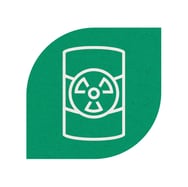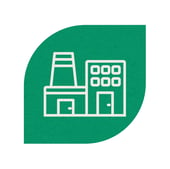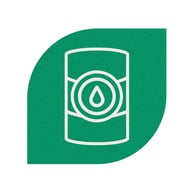Specialized waste can be harmful to employees and the environment. However, the various categories can be confusing. We’re here to reduce your confusion with a quick and helpful breakdown of the categories and the impacts they can have.
Most businesses generate some form of specialized waste. This waste requires special handling and disposal due to the potentially harmful properties of the materials. Specialized waste breaks down into:
Hazardous waste
Special waste
Medical waste
Chemical waste
Each specialized waste category has unique characteristics to classify. Let’s look at each type of specialized waste, what makes them unique, and why it’s important to properly dispose of these materials.
SPECIALIZED WASTE CATEGORIES
 HAZARDOUS WASTE
HAZARDOUS WASTE
Hazardous waste is capable of causing harm or potential threats to human health or the environment during handling or disposal. The EPA considers waste to be hazardous if included on their specific list of hazardous waste or if it exhibits one or more of the following characteristics:
Ignitability: flammable liquid or solid waste
Corrosivity: waste that can rust or decompose
Reactivity: explosive waste
Toxicity: poisonous waste
Considering the risk involved in handling hazardous wastes, they are heavily regulated and cannot go through traditional disposal. Organizations that handle hazardous waste must obtain an RCRA permit and follow state regulations. The Resource Conservation and Recovery Act gives EPA the authority to oversee hazardous waste from "cradle-to-grave." Regulations cover everything from generation, treatment, storage, and transportation, all the way to disposal.
 SPECIAL WASTE
SPECIAL WASTE
Special waste requires customized handling, trained workers, and unique disposal methods. For example, manufacturing plants generate a significant amount of specialized waste, including sludge waste, hazardous byproducts, or general waste. Businesses that produce specialized waste must profile it in a form used to identify the quantity, composition, origin, and destination. With this information, the accepting facility will know what waste to expect and determine the best disposal method.
 MEDICAL WASTE
MEDICAL WASTE
Medical Waste can contain infectious material. Common types of medical waste include:
• Sharps (anything that can create a cut, such as needles)
• Pharma Waste (vaccines and drugs)
•Trace Chemotherapy waste
• Bandages
• Gloves
• Blood products
Due to the potential risks of handling infectious medical waste, healthcare facilities must follow proper waste disposal protocol to protect their staff, service providers, and communities. State and federal agencies regulate medical waste creation and disposal. Typically, healthcare facilities must separate their hazardous waste from non-hazardous waste in appropriately labeled containers. Improperly managing these materials can put the health of your service provider and the general public at risk.
Many different agencies oversee the handling of medical waste, including:
Food and Drug Administration (FDA): Regulates the manufacturing of sharp containers.
Occupational Safety and Health Administration (OSHA): Regulates the handling of medical waste to ensure employee safety.
Centers for Disease Control (CDC): Issues guidelines for controlling infection.
 CHEMICAL WASTE
CHEMICAL WASTE
Chemical waste contains chemicals that are harmful to the environment and/or human health. The most prevalent types of chemical waste are:
• Solvents and chemicals used for lab purposes
• Batteries
• Heavy metals from medical equipment
• Pesticides
• Toner cartridges
• Cleaning products
Most businesses have some chemical products that can be harmful if not stored or disposed of properly. Due to the safety risks of handling chemical waste, businesses must adhere to safety precautions and proper disposal methods. Along with the other types of specialized waste, properly managing chemical waste ensures the safety of employees and the health of our environment.
CONSEQUENCES OF MISMANAGED SPECIALIZED WASTE
![]()
FAILED INSPECTIONS
To ensure businesses properly handle their specialized waste, the EPA and its regulatory partners conduct routine monitoring and inspections of the facilities that generate the waste. Waste inspections consist of an on-site evaluation of the business's compliance with RCRA regulations and relevant permits. These inspections ensure the facility handles the waste in the safest way possible to protect human health and the environment. Inspection failure is not only costly for a business but can disrupt the company's operations and negatively impact its reputation.
![]()
RISK TO HUMAN HEALTH
Failing to follow the proper guidelines for managing specialized waste can put your employees, service providers, and the public at risk. Potential outcomes of mismanaged waste include fires, explosions, accidents, spills, and exposure to toxic substances, which can lead to injury or even death. For these reasons, businesses must comply with regulations to protect humans and our environment.
![]()
EXPENSES
One often overlooked element of mismanaging specialized waste is the monetary ramifications. Mismanagement of hazardous waste can cost your organization money in the following ways:
- Failed inspections can result in hefty fines.
- If one of your employees or patients is injured or dies, loss of life not only affects everyone around them but also raises insurance premiums.
- A negative reputation can result in revenue losses.
- It can take significant time to rebuild your brand and clean up your operations after a fine or an accident.
![]()
ENVIRONMENTAL IMPACTS
Mismanaging specialized waste can be detrimental to the health of the environment. For instance, chemicals not disposed of properly can enter our waterways and make the consumption or use of the water for agriculture unsafe. Also, pollution or toxins from the mismanaged waste can end up in surrounding streams, ground, and the air. Toxic pollution can lead to cancer and diseases in humans and death for animals and plants.
Let us know in the comments below which kinds of specialized wastes your business produces. We’re here to help control your specialized waste management for your health and for the greener good!

